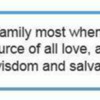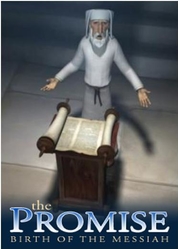Bible Backgrounds from The Promise
Mary
By Rev. Lon Vining (Glorious Films)
How Do You Solve A Problem Like Maria?
“How do you solve a problem like Maria?” Those words, famously sung in The Sound of Music, could have been the theme song of Glorious Films’ writers and artists as we tackled the difficult task of bringing to life the figure of Mary, the mother of Christ.
Portraying a person who is as well-known and beloved as Mary presents loads of challenges. First, we had to find the real Mary of history. To do that we had to get beyond the clichéd version of Mary from popular culture – you know, that super-spiritual saint with the angelic demeanor who lived above the problems and pains experienced by “real” people. So we dug into the Gospels. There, we found little attention given to the personal details of Mary’s life. When you come to the Gospels, you are dealing with a unique form of ancient historical biography that is not the same as modern biographies or historical novels that delve deep into the psyches of each character and describe every facet of their life in minute detail. The Gospels were designed to tell people essential information about the life and work of Jesus the Messiah — not details about his mother’s personality, age or appearance – or what dress she wore at Passover celebrations!
Piecing Together the Puzzle
Our team had to piece together the bits of information we did find in the Gospels about Mary in order to construct a sketch of her that was as accurate as possible. Scripture tells us that Mary was a favoured woman (Luke 1:28) and from the obscure village of Nazareth (Luke 1:26). Luke 2:24 says the couple offered "a pair of turtledoves, or two young pigeons," This was not the normal Levitical requirement, which was a lamb, but was a less costly alternative applicable only in the case of poor couples (Leviticus 12:8). Therefore, we know that Joseph was poor. His profession is also an indicator of his status. A carpenter in NT times did not have the same status as today’s carpenter, but was liken to a poor construction worker. The word may refer to either a worker of stones or of wood. This means that Mary was a poor, peasant because if there was a difference of class/financial status between the married couple, it was the man who was of higher status. Women did not marry “down,” (at the insistence of their fathers), they almost always married “up.” So Mary was necessarily of the peasant class. This seems to be in keeping with the tenor of the entire nativity of Jesus: God is born in a humble town in a humble setting and to humble parents and worshiped by humble shepherds. History tells us that Jewish brides of the period were often young by today’s standards — with some marrying as early as 13 years old –so Mary was very likely this side of 20 years old when she was engaged to Joseph.
We know that she caught the eye of “a righteous man,” Joseph (Matthew 1:19), a poor carpenter (Matthew 13:55 & Mark 6:3), and was pledged to be his wife (Luke 1:27).
Mary was clearly a person of great faith and devotion to God. When Gabriel told her she would bear the promised Messiah, she didn’t doubt that God could cause such a thing to happen, but she simply asked how she was going to have the baby (Luke 1:34) — since she was a virgin and had kept herself pure before marriage. Compared to biblical figures like Zechariah (Luke 1:20), Sarah (Genesis 18:12) who doubted God when they were told they would have a miracle child (and were reproved by God for their lack of faith), Mary believed God immediately. Because of her faith, Gabriel was happy to tell her how it would happen – “by the power of the Holy Spirit.” (Luke 1:31)
Mary also showed enormous humility as she accepted the task God had given her, saying, “Let it be as you have said. I am a servant of the Lord.” Mary’s song of praise, the Magnificat (Luke 1:46-55) also showed a serious and careful devotion to the Word of God (listen to our version entitled “I Will Magnify” on the music page). In this song of spontaneous worship, Mary draws on deep theological themes and ancient prophecy to extol the grace and mercy of God for sending the Messiah to save His people. Clearly, Mary knew God and knew much of His Word by heart.
Faithful, not Flat
It was this kind of faith that served Mary well as she faced the questions – and scorn – of parents, family, and her community, who could hardly be blamed for doubting her story. The hardest thing of all was telling her fiancé Joseph, who must have been crushed (Matthew 1:19) when he learned that she was pregnant. Joseph doubted Mary, but God did for Mary what He does for all His servants – He provided for her needs. For Mary’s need, God sent Gabriel to Joseph (Matthew 1: 20) to confirm her story in a dream. As for her parents, God through Gabriel gave Mary a message (Luke 1:36) that her elderly cousin Elizabeth was miraculously pregnant – something that her parents did not yet know – and the Lord surely must have used this to validate her story and vindicate Mary to them.
The NT also portrays Mary as a normal person with all the attendant issues of human frailty and emotion. Stories such as the one found in John 2 where she seems to use her motherly authority to persuade Jesus to help a young couple in a tight spot at their wedding ceremony suggest that Mary was a formidable and confident figure who used her influence to help others. Luke 2:51 says she “treasured up” Jesus’ character in her heart. Mary also made mistakes. She misunderstood Jesus and even doubted His sanity at one point (Mark 3:21,31)! And, as Simeon prophesied, “a sword pierced her soul” (Luke 2:35) at Jesus’ crucifixion.
Mary blessed God (praised, glorified, obeyed, loved Him) long before He chose to reveal her special blessing. Mary recognized the greatness of God and revered Him as her Master and was “blessed among women” (Luke 1:42) because God was so glorified by her life
Problem Solved
In the end, “the problem” of Mary was not as difficult to solve as it at first seemed it would be. When the Glorious Films team gathered all the facts about Mary, we found a portrait of a real person. We concluded there was no way she was the flat, boring, Victorian-esque prude we’ve seen portrayed in film and print. Mary was a real human being spiritually, physically and emotionally. She surely had a vibrant but humble personality to match her infectious faith. Hers was a big faith in an even bigger God that she knew personally. She was just the kind of person who God would assign to raise His Son. That’s the Mary we developed for The Promise: Birth of the Messiah. I think you’ll enjoy meeting her this Christmas.
Joseph
By Rev. Lon Vining (Glorious Films)
An ‘Average Joe’ Men Can Model Their Lives After
Most Christians yearn for examples of godly people to pattern their lives after, and a pair of good candidates for the job, are Mary and Joseph, the parents of Jesus. When you think about it, Mary and Joseph were the ultimate power couple. They were, after all, the man and woman chosen by God to raise the Messiah! But while women have for millennia looked to Mary as the supreme example of godly womanhood, men have found Joseph to be a much more elusive figure on which to build a picture of biblical manhood. That’s probably because there is not a lot written about Joseph in the New Testament. But when you take a deeper look into the details concerning this tall, dark and handy figure from Nazareth, you find there is a lot more to him than meets the eye. In fact, there are five outstanding traits one can observe in Joseph that any man would do well to model his life after.
- Joseph was an ‘Average Joe’ Who Lived an Above-Average Life
Laying all the “average Joe” puns aside, Bible scholars tell us that Joseph’s profession and other details of his life indicates he was a simple peasant. Carpentry didn’t pay much in his day, so Joseph had to work hard for a living, and he didn’t have a lot to show for it. Joseph was a regular blue-collar worker, a builder who made a living with his hands (the word we translate “carpenter” in our English Bibles is simply “builder” in Greek, and may refer to woodworkers, stone-workers or other types of craftsmen). To make Joseph’s character authentic, the script writers for The Promise were careful to write dialogue and song lines for Joseph that were what you’d expect from a construction worker, not a priest or a scholar, and the voice actor for Joseph, Michael Daniel Murphy, was chosen for his earthy, less formally trained vocal style. Far from being a guy that is hard to relate to, Joseph’s earthiness makes him imminently relatable. The message is, if Joseph can be used by God, so can any man.
- Joseph Exhibited Integrity and Grit in the Face of Adversity.

Imagine being faced with all the trials Joseph went through. The seeming betrayal of Mary. Joseph came through it. A Roman census for which he had to make a difficult journey with his very pregnant wife to Bethlehem? No problem, pack the donkey. No place to stay in Bethlehem – and Mary goes into labor? We’ll just have this baby in a barn! When the going got tough, Joseph got going. Of course the real Joseph sweated through these predicaments just like any man, but the point is he powered through them with grace and endurance. He got ‘er done, and gives us a great example of what God can do through any faithful man.
- Joseph Showed True Love.
We aren’t privy to Joe and Mary’s love life, but we certainly see a powerful example of genuine love in several respects. First, we are told that Joseph remained sexually abstinent from Mary before marriage. “True love waits” is more than a slogan, it’s the truth. He honored Mary and God by waiting. And don’t imagine for a minute that it was easier to remain pure in Joseph’s day. The Bible gives repeated admonitions to remain sexually pure for one reason - the temptation to do otherwise is great! In addition, the way Joseph handled the shock of Mary’s pregnancy showed much grace. Legally, he could have had her publicly shamed or even stoned for adultery, but he decided not to be vengeful, but to “put her away quietly.” But after the angel Gabriel revealed the divine identity of the child and miraculous nature of Mary’s pregnancy, Joseph wasted no time in taking her as his wife. Surely this man who raised the Messiah taught Jesus the meaning of love through his words and his life.
- Joseph Protected His Family
Joseph was determined not to let anything happen to his family, even if it meant leaving everyone and everything he ever knew. When he learned that Herod sought to kill Jesus, he outsmarted and outran one of the most brutal kings in history as he fled to Egypt and lived there until Herod died. As a refugee in a foreign land he was away from the security of family, the assurances of the law, and normal employment. All was at stake, and everything was different and uncomfortable. But Joseph was more than willing to do this to protect his family at all costs. Every man should strive to protect his family with this warrior-like protective attitude.

- Joseph Trusted and Obeyed God.
This is probably the most clearly illustrated trait in Joseph’s life, and the key reason he was chosen to parent the Messiah. Joseph is called “a righteous man.” (Matthew 1:19 NAS) You have to be spiritually attuned to God to hear from him directly, and in fact Joseph believed the angel’s message from God via dreams three times: first, concerning Mary’s miracle pregnancy (Matthew 1:20-23), second concerning Herod’s intent to kill Jesus (Matthew 2:13-14) ,and third, when he got the “all-clear” to return to Israel upon Herod’s death (Matthew 2:19-21). Joseph also showed his devotion to God by following the law to a “T.” He presented Jesus at the temple for circumcision on the eighth day and he brought his family to Jerusalem for the appointed feast days each year. And Joseph clearly taught Jesus the Scriptures well as a child, because by age 12 Jesus was confounding the teachers of the law in the temple with his learned questions (Luke 2:47, 52). This was not only a function of Jesus’ divinity, but also of his discipleship at the feet of his earthly father. Though only a “working-class guy,” Joseph knew and followed God’s Word and taught it to Jesus. All evidence points to him also teaching well his other children. Don’t forget, his son James, Jesus’ brother, later led the first congregation in history – the Jerusalem church! A man loves his family most when he helps them know God, the source of all love, and God’s Word, the source of all wisdom and salvation.
Conclusion – It’s a Matter of the Heart.
As far as we know, Joseph wasn’t flashy, rich, super-educated, a great public speaker, or a snappy dresser. That God used a humble peasant like Joseph for such a significant purpose shows us that true greatness isn’t about externals, but is always about the heart. Just like his great-great-great ancestor David, the Lord chose to use Joseph because he was “a man after God’s own heart” (1 Sam 13:13-14). Christian men today can model their lives after Joseph’s, and, like him, can enjoy the benefits of friendship with God and partnership.

Attention Supporting Members!












 finally loosed in The Promise, this fun-loving priest explodes in a song of prophecy and praise that is one of the movie’s most memorable moments. So powerful were his words in Scripture, that a version of Zechariah’s song, the Benedictus, is still sung by the church today.
finally loosed in The Promise, this fun-loving priest explodes in a song of prophecy and praise that is one of the movie’s most memorable moments. So powerful were his words in Scripture, that a version of Zechariah’s song, the Benedictus, is still sung by the church today.










